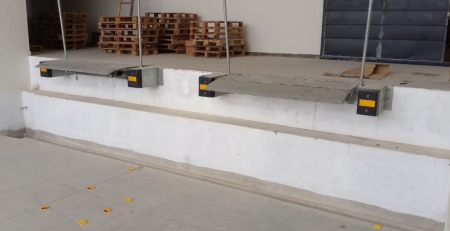How to Choose the Right Dock Leveler for Your Facility?
In logistics and warehouse management, efficiency and safety are top priorities. One crucial component that ensures smooth loading and unloading operations is the dock leveler. A well-chosen leveler bridges the height gap between loading docks and delivery vehicles, minimizing damage to goods and reducing workplace injuries.
Choosing the right dock leveler for your facility depends on several factors, including the type of vehicles used, load capacity, frequency of operation, and safety requirements. This guide will help you navigate through the key aspects of choosing the perfect dock ramp for your business.
Loading ramps usually come in two types, Mechanical and Hydraulic. You can choose between them as per your need.
Mechanical
- Operate using a spring system and require manual activation.
- Installed within a pit at the loading dock door.
- Activated by pulling a chain to raise the leveler and position it onto the trailer bed.
- Cost-effective solution for standard shipping and receiving operations with lighter loads.
Hydraulic
- Powered by a hydraulic system, eliminating manual operation.
- Raised and lowered with a push-button control.
- Designed for handling heavier loads and frequent use.
- It is ideal for high-speed facilities managing demanding freight transfers.

Key Aspects to Consider While Choosing!!!
1. Load Capacity & Weight Requirements
One of the primary considerations is the Loading dock ramp’s load capacity. If your facility handles heavy loads, ensure the leveler can support the maximum expected weight, including forklifts and pallet jacks. For instance, Mechanical docks can haul 6 to 10 tons, while hydraulic docks can haul 12 to 20 tons.
2. Frequency of Use
The leveler’s durability depends on its daily usage. If your dock is used frequently, hydraulic or air-powered levelers are better as they require less manual effort and withstand constant use. Hydraulic ramps are also suitable for heavy-duty and high-volume operations. Mechanical levelers may wear out faster with heavy use.
3. Type of Vehicles & Dock Heights
Different trucks have varying deck heights. Choosing the right leveler that accommodates a range of truck sizes ensures smooth loading and unloading is essential. For instance, Edge-of-dock levelers work well for facilities handling a single type of vehicle, while pit-style levelers are better for mixed fleets. The standard loading ramp height range is typically 48 to 52 inches and applies to almost all freight loading docks.
4. Safety Features
Safety is a priority in any warehouse or distribution centre. Check the accessories like toe guards, foam insulation, and air seals. Also, consider these things for better safety in the workplace.
- Anti-slip surfaces to prevent accidents.
- Lip extensions to ensure better contact with truck beds.
- Automatic safety stops to prevent sudden drops.
5. Durability & Maintenance Needs
Durability and Maintenance needs decide you save your cost for longer terms, provide safety assurance, increases operational efficiency and will need lower maintenance requirements. Consider how much maintenance your loading dock will require. Mechanical levelers need regular lubrication and spring adjustments, whereas hydraulic and air-powered models have fewer moving parts and require less frequent maintenance. In order to control long-term problems, a qualified and authorized technician should inspect the unit every 90 days.
6. Dock Leveler Dimensions
Length
The length is based on the steepest slope that internal transport can handle and the type of goods being loaded. If there is a significant height difference between the vehicle and the loading bay, a longer leveler is needed. It’s important to check the types of vehicles coming in to ensure the slope stays safe for loading and unloading.
Width
The width depends on the size of the trucks, the type of goods being loaded, and the equipment used for transport. Choosing the widest possible leveler makes it easier to position loads, especially when loading below platform level, where space is limited by the pit’s edges.

7. Environmental Conditions
Environmental conditions are also important to consider when deciding on material durability and efficiency in climate conditions. For facilities exposed to extreme temperatures or outdoor weather, vertical and hydraulic ramps offer better insulation and security. These ramps are eco-friendly and weather-resistant for outdoor activities. Choose rust-resistant materials if your dock is in a high-humidity environment.
8. Installation and Maintenance Considerations
When choosing a dock ramp, it’s essential to study both installation costs and maintenance. Professional installation ensures proper alignment and long-term durability, while DIY installation may lead to frequent issues. Regular inspections and lubrication extend lifespan, with hydraulic and air-powered levelers requiring less maintenance compared to mechanical ones.
9. Cost Considerations & ROI
While hydraulic and air-powered ramps have higher upfront costs, they save money in the long run by reducing downtime and maintenance expenses. Mechanical levelers may have lower initial costs but require frequent upkeep and daily checks. You should choose based on your budget and long-term operational efficiency.
Find the Perfect Loading Ramp for Your Facility
Choosing the right dock leveler is just one part of the equation. Partnering with a credible supplier ensures you receive high-quality products and exceptional service. When evaluating suppliers, consider their experience in the industry, the variety of leveler options they offer, and customer reviews. A supplier that provides warranties and after-sales support can help you avoid operational disruptions in the long run.
At Mechatronix Solutions, we specialize in providing top-quality dock levelers that enhance safety, efficiency, and durability. Our experts are ready to help you find the best solution for your facility’s needs. Whether you need a hydraulic, mechanical, or air-powered loading ramp, we offer customized solutions to match your operational requirements.
Reserve A Dock For your Business!



